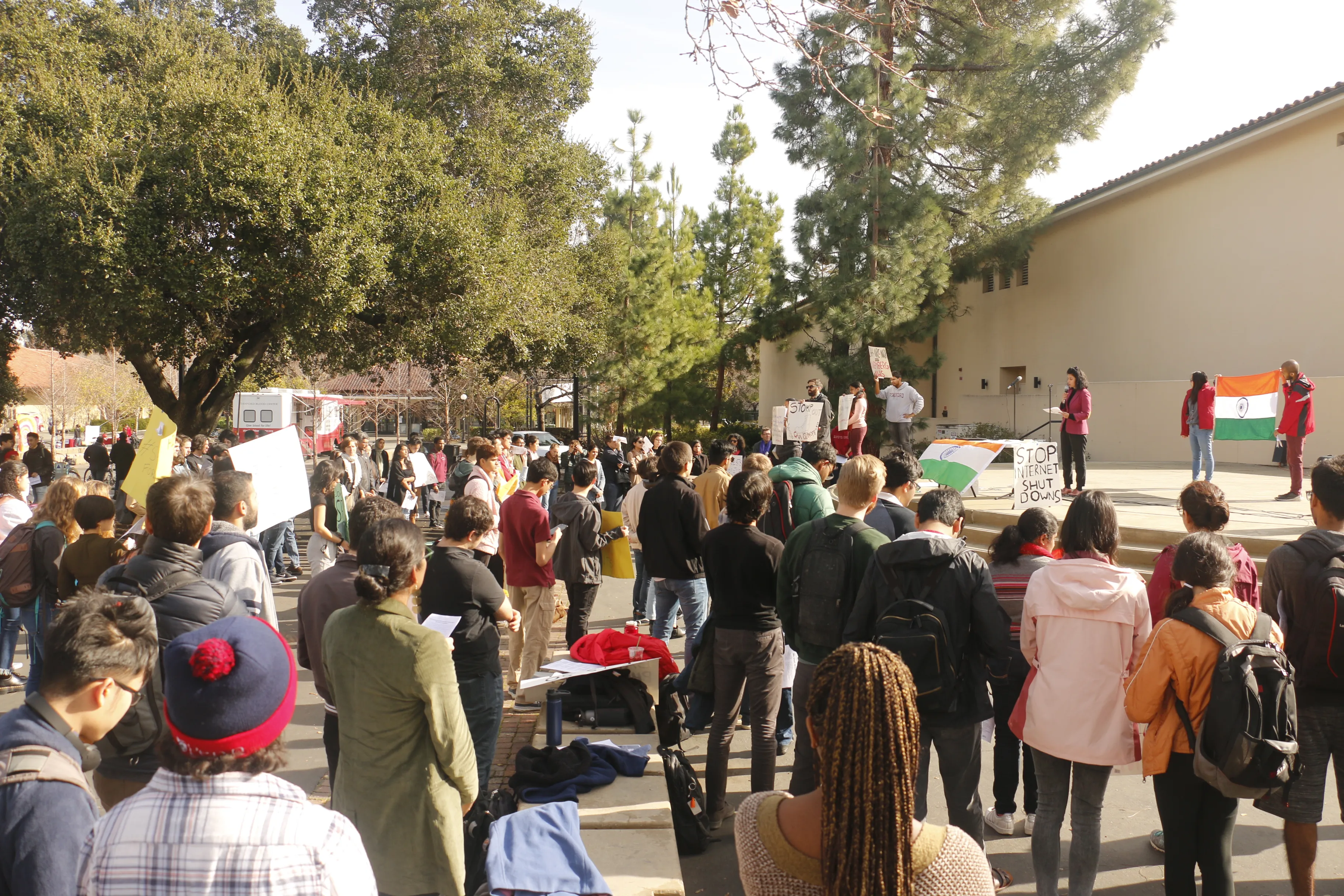Students gathered in White Plaza on Friday afternoon to protest India’s controversial Citizenship Amendment Bill. The rally, held in solidarity with student activists at Indian universities, saw speakers address a 150-strong crowd to denounce the bill.
The Citizenship Amendment Bill, which provides a path to Indian citizenship for immigrants of several religions but excludes Islam, provoked intense controversy in India after the upper house of the Indian parliament passed it on Dec. 11. A spokesman for the Indian Foreign Ministry told the New York Times that the bill is intended to protect “persecuted religious minorities already in India from certain contiguous countries.”
“It seeks to address their current difficulties and meet their basic human rights,” said the spokesman, Raveesh Kumar.
Critics argue that the bill violates India’s founding commitment to a secular state by restricting citizenship by religion, and could facilitate the detainment of Muslims in India who don’t meet the requirements of a proposed National Register of Citizens being trialled in part of the country. The U.S. Commission on International Religious Freedom said it was “deeply troubled” by the bill’s passage.
The bill was met in several Indian cities with vigorous protest, which intensified amid reports of attacks on student demonstrators. On Friday, activists brought the movement to the steps of White Plaza.
The Citizenship Amendment Bill “flies in the face of 70 years of our secular history,” said one of the rally’s organizers, a junior who asked to remain anonymous for fear of retaliation. “This rally [is to] show that… the rest of the world is very aware of what [Indian Prime Minister Narenda Modi] is doing and how he’s targeting Muslims, and we’re not going to stand for it.”
“As students ourselves who don’t have to worry about the kinds of violence that are being inflicted on students [in India], we have the responsibility to stand up against violence on students — to stand up for campuses as places of safety,” he added.
The rally’s organizers distributed handouts and led the group in recitations of the preamble of the Constitution of India and Indian protest song “Hum Dekhenge.” Passersby from the nearby Tresidder Student Union occasionally wandered across to join the crowd.
Though the Stanford campus is no stranger to demonstrations, Friday’s spotlight on Asian political issues was uncommon.
“For this protest to happen on campus was very important,” said second-year art history Ph.D. student Ankita Deb. “It makes me feel like Stanford [isn’t] as removed from things that are happening back at my home or from the rest of the world.”
Numerous students and faculty addressed the crowd at the rally. Rishika Mehrishi, a fourth-year theater and performance studies Ph.D. student, echoed the notion of generating international pressure in her speech.
“It is this power to protest, to stand in solidarity against all that is messed up around us … It is that power that Modi fears us for,” she said to the crowd. “Mr. Modi, you’re afraid of me. Mr. Modi, you’re afraid of all of us standing here.”
Speakers also linked the implications of the Citizenship Amendment Bill to the plights of immigrant and minority groups around the world, and noted a common history of civil disobedience in India’s struggle for independence and the civil rights movement in the United States.
Many present at the rally shared personal stories about the demonstrations and students affected. Film and Media Studies professor Usha Iyer spoke of violence she witnessed on a visit to India.
“I can break into tears when I’m enraged, and this is a time to be filled with rage,” she said.
“I thought the event was remarkable,” said Ethan Chua ’20, who also spoke at the rally and has written opinion pieces for The Daily. “For me personally, it was really moving to see so many professors here too, knowing that there are professors on this campus that stand here with us as activists for a more just world.”
The protest ran without any disruptions and closed with a playing of the Indian national anthem. The rally’s organizers said they plan to stay involved in the movement.
“This is a long struggle,” said co-organizer Shantanu Nevrekar, a first-year Ph.D. student in Anthropology. “I do not exactly know for sure what comes next, but in San Francisco there is a rally in front of the Indian Consulate which is happening on the 26th of January … For starters we could show solidarity with them, and that could be a good starting point from which we [could] do something bigger.”
“This administration in India is not stopping anytime soon,” he added. “We probably won’t stop as well.”
Contact Daniel Wu at dwu21 ‘at’ stanford.edu.
